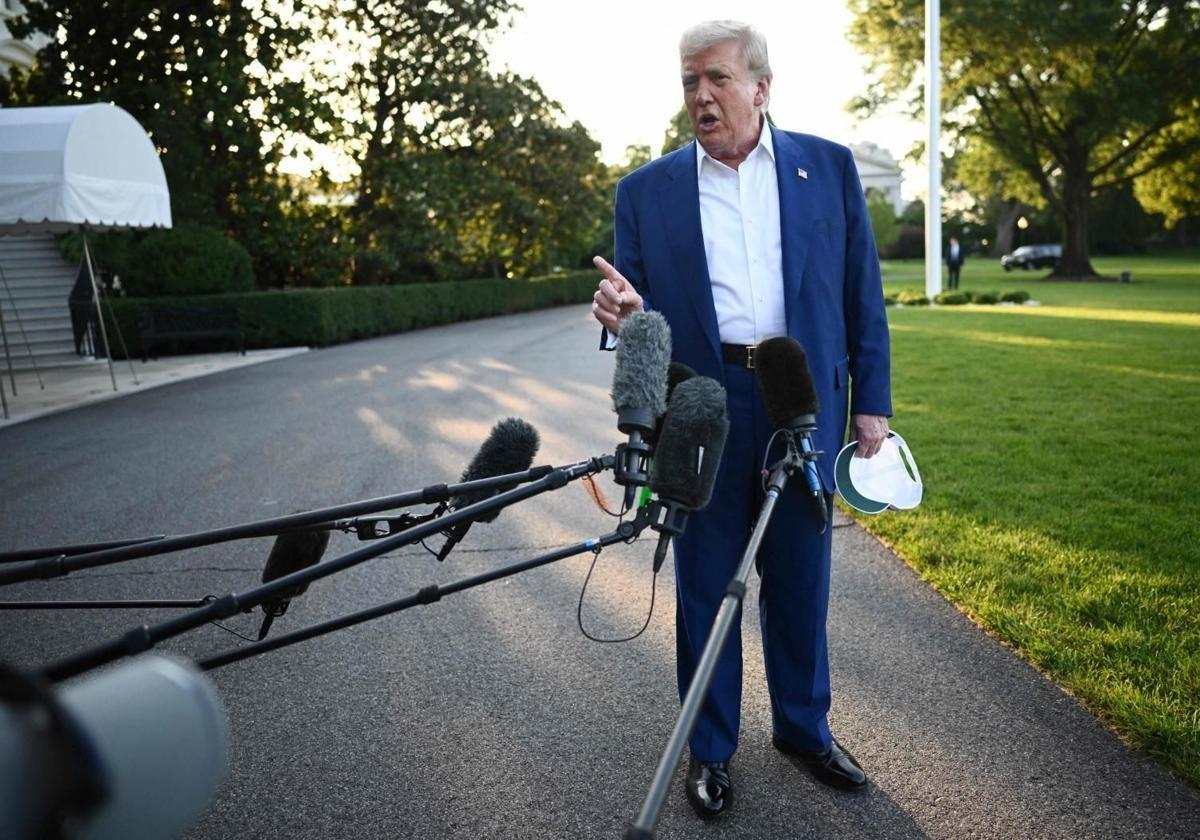Trump calls Spain 'disloyal' and a 'problem' for Nato investment
The alliance wants to tie down The Hague with 5% spending per country to ensure strong 'transatlantic cooperation' between the US and Europe
Without even having landed in The Hague, US President Donald Trump launched his first darts at the Nato summit on Tuesday, which were aimed at Spain. The tenant of the White House stated that Spain "is a problem in terms of Nato (military) spending" and lashed out at the government headed by Pedro Sánchez for not agreeing to raise defence investment, which Trump finds "unfair to the rest" of the allies. Spain is the ally that has most openly refused to raise its military spending to 5% of the GDP by 2032.
Trump's declarations are not spontaneous, but rather reflect ambitions that he has long been sitting on. Already at the 2018 Nato summit in Brussels, the US President threatened to leave the organisation if the alliance did not commit to doubling military investments, then set at 2%. He was particularly harsh on German Chancellor Angela Merkel and Spanish Prime Minister Pedro Sánchez, who had only recently taken office.
The context this time is different. Washington landed in the Netherlands with the 5% deal already in place and at a summit tailor-made to please the President. Unlike previous Nato secretaries, who have tried to remain impartial despite almost always bending to the wishes of the White House, Mark Rutte seems to have absolute reverence for the president.
On Tuesday afternoon, Trump leaked messages with Rutte, who was congratulating him on the 5% spending agreement. "You are going to achieve what no American president has ever achieved," Rutte says in the messages. What is left to interpretations is whether the Dutch politician, known for his pragmatism, is acting out of admiration, courtesy, flattery or strategic calculation.
Rutte opened Tuesday's summit with two very clear ideas. The first was the importance of Western military industry. He said that Russia, "with an economy 25 times smaller than Nato's", cannot "surpass in production and armaments". The second was that "there is no European security without a strong transatlantic link". Nato's secretary is convinced that today's challenges and threats require US-European collaboration. For this reason, he called for "breaking down barriers and promoting true transatlantic defence cooperation".
'Russia, with an economy 25 times smaller, cannot surpass us in military production and armaments'
'We have a problem with Spain on defence spending. It is very unfair to the rest of the allies'
However, the pact reached between Pedro Sánchez and Mark Rutte that allows Spain to dodge the mandatory 5%, as long as it meets the capability targets agreed with Nato, has left Trump bitter. Despite the agreement, Rutte believes that Spain's current 2.1% investment would not be enough to meet its commitment to the Nato, holding that "at least" 3.5% should be invested.
The US President's discontent has been growing. In a speech in Davos last January, he accused some allies of "taking advantage of the US" due to their low defence spending. Until now, Spain was at the bottom of the alliance in military investment, equivalent to 1.28% of GDP. Trump posted a graphic representing this figure on his social media on Tuesday to underline Spain's scant support. The injection of 10 billion announced by Sánchez's government, however, will allow the country to reach 2% this year.
Meanwhile, the White House is already selling the 5% agreement as a "historic success". However, the formula that Rutte has put on the table contains a catch: it estimates that allied countries must invest 3.5% of their GDP in direct military spending and the remaining 1.5% in indirect defense-related investments. In this way, the alliance's political chief secured the necessary support to adopt the declaration, which will be signed on Wednesday during a working session.
Iran and Ukraine
Currently, only Poland and the Baltic states (Lithuania, Latvia and Estonia) are close to the alliance's 5% target. Others, such as Sweden, Finland and Germany, have announced heavy military and security spending that will bring them closer to the target. Countries such as Spain, which have struggled to reach the 2% target this year, "still have a long way to go".
The Hague has half a million inhabitants who are witnessing a radical transformation of their city into a bunker. An extra 25,000 police and 10,000 military personnel are endorsing security in the streets, stations and institutions along with a group of frigates and F-35s to protect the 32 alliance partners and guests.
While the financial issue is at the heart of the summit, other issues will be at the centre of the debate. The US bombing of Iran's nuclear bases, the truce between Iran and Israel and the growing tension in the Middle East will be on the agenda. For Rutte, his "greatest fear" is that Tehran - a Russian collaborator - will get its hands on a nuclear weapon.
But the alliance is already looking further east. In his inaugural speech, Nato's secretary saw China as another potential threat. He recalled that "Beijing has a powerful military industry". "Xi Jinping may call on Putin to help him," said Rutte.
Ukrainian President Volodymir Zelensky also attended the summit, although his participation was limited compared to the summits in Madrid last year and Vilnius in 2023. Rutte said that the allied countries will provide the Ukrainian army with "everything necessary" for its security.

